#character tips
Text
Want quick tips to add instant chemistry to the relationships of your characters??
(🥳With examples🥳)
First of all, I want to say that you can also use most of them for platonic/ non-romantic relationships, so feel free to use this tips however you think they might work better in your story. So, without further adue, let's get to the tips!!!
Make your characters LISTEN to each other. Like, if A tells B they're not a morning person, B could make some coffee for A or lower the volume of their alarm.
This might sound quite obvious, but show that you characters care for each other. It might be as simple as one of them giving the other a glass of water when they feel a little dizzy, but it works wonders!
Make your characters physically close. When you are emotionally close to someone, you tend to be physically close too. But here is the thing. Make your characters react like it's second nature: "how would I not hug B when I haven't seen them in days?" or "Of course I'm gonna take A's hand when I feel insecure".
They don't have to be constantly thinking about each other, but when they do, MAKE IT MATTER!! For example, character A is out shopping, and they see B's favorite cookies. B didn't have a good day, and A knows that. But A also knows B is gonna fucking love the cookies, so they buy some.
Let them believe and trust each other. Also applies if one of them is a little distrustful: let your characters rely on one another, even if at the start they aren't as comfortable doing it. For a distrustful character, letting the other one help with chores might be a HUGE thing.
Other tips for writers: previous | next
#writeblr#writing#writer#writers#writers of tumblr#writers on tumblr#writerscommunity#original character#character development#character dynamics#main character#chemistry between your characters#writing tips#tips for writers#character tips#tips#creative writing
3K notes
·
View notes
Note
Heyo! I hope it’s okay to ask, but I have a question about character design.
I had the idea for a phoenix themed mage, and was considering having feathers growing alongside their hair. But my second thought was how I don’t know if that would be offensive to indigenous people.
If you don’t know the answer, do you know where I could learn?
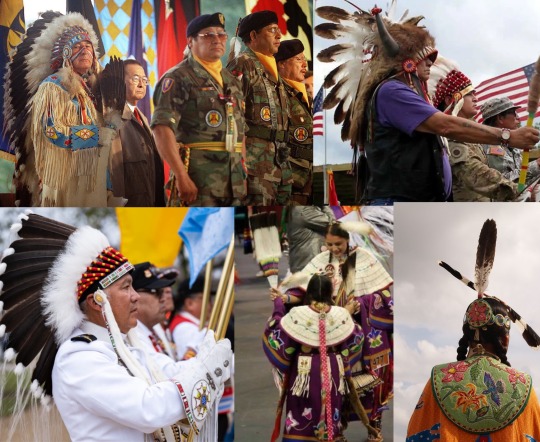
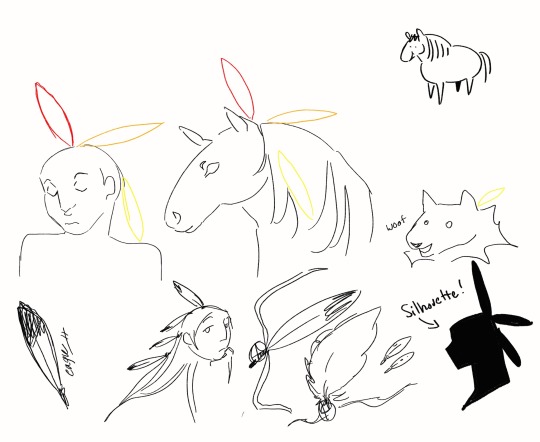
The thing about feathers and character designs is that nowhere else uses feathers like we do and the silhouette is very unique to us specifically. Looking up feathers in character design or in specific cultures it always seems to come back to us good or bad. So in order use feathers in character designs you have to try not to use our silhouettes with the feathers. (Eagle feathers, head dress, brooches,bustles,ex.) I feel like people don’t understand the importance of feathers like each one you earn or is past down to you by family. During powwows and ceremonies if one falls off they have to completely stop the competition/ceremony and you are disqualified and you have to give away that feather because you disrespected it. And by law we are the only ones allowed to have eagle feathers 🤷♀️ it’s a religious thing not an aesthetic
I say consider what bird you wanna use, what they associated with, and use the feathers in a different manner silhouette wise. Like incorporating the bird’s silhouette and stuff. I like what the warrior cats fandom did and moved the feathers to the shoulders instead of head. Because yes we put feathers on our animals as well for the same reasons.
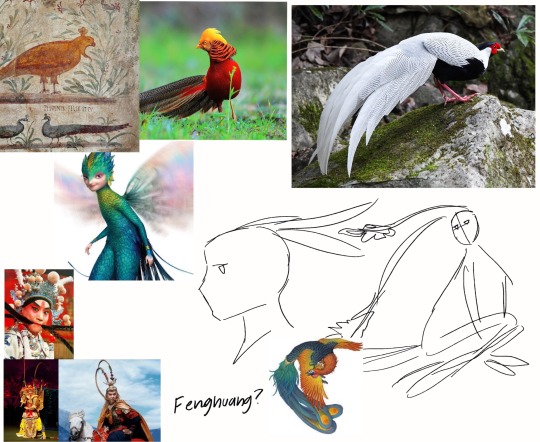
352 notes
·
View notes
Text
★ ៸៸៸ FRIENDSHIP 1 ╱ post ❜ ✸ ៸ !?!
Good friendships can turn a decent story into a memorable one as, it not only does it make the reader care more about the story, it adds emotional weight to the story.
But there's one problem. Good relationships are difficult to write. You thought writing romance was difficult? Well, writing friendships is a whole new level of difficulty.
Romances normally rely on professions of love and staring into one's eyes for lengthy periods of time. But, how do you develop friendships?
# ៸ make each character their own person.
If a character's only purpose in the story is to act as "the friend", then it's guaranteed that they will be a flat and uninteresting character. This will lead to a friendship that no reader will be invested in.
Unfortunately, a lot of stories are like this ― you have your main character, and then their 1-dimensional friend who might crack a joke every once in a while.
We have some good examples from movies like Samwise Gamgee from The Lord of the Rings. He isn't just "Frodo's friend" who tags along. He's a gardener and a cook. He has a fascination with elves, a crush on Rosie, and a bad habit of eavesdropping. He is loyal, brave, and can persevere even when there is seemingly no hope.
You see this is in Toy Story as well. Even though Woody and Buzz both have the same goal ― to escape Sid's house ― they both have different journeys. The story means different things to each of them. Woody learns to not be as selfish and Buzz struggles with accepting that he is just a toy.
# ៸ give them something in common.
Once you have fleshed out your characters, you need a reason for them to be friends. What brought them together? What gives them the reason to hang out? You need to give them similarities.
This can be a number of different things, like:
★ Status
★ Hobbies
★ Struggles
★ History
★ Background
★ Interests
★ Enemy
★ Goals
★ Dreams
# ៸ give them meaningful differences.
Once you've established their similarities, it's time to dig deeper and create their meaningful differences. Don't just make your characters different. Give them meaningful differences that can build off of each other.
With those differences, your characters can help support their strengths and build them up during their times of weakness. This can lead to a strong friendship.
Here are some great ways to give them differences:
# ៸ skills.
★ One of the friend can be smart in terms of intelligence while the other is good at using her hands and inventing stuff.
★ One might be good at coming up with plans, while the other might be good at improvising when the plan goes awry.
# ៸ conflict resolution.
★ If there is a bully bothering them, one might want to go and blow up at the bully, while the other chooses to ignore it.
★ If they are having an argument, one friend would want to talk it out maturely, while the other just likes to play devil's advocate and throw more heat into the argument.
# ៸ personality.
★ One is confident and sly while the other is shy and awkward.
★ A is cold and determined while B is relaxed and compassionate.
★ B is an easy-going pleasure seeker, and B is a serious planner.
# ៸ method of action.
★ Both friends are trying to break into a house. One will look up videos on YouTube about how to pick a lock. The other friend will just break the window with a rock.
★ The two friends are trying to persuade someone to do something. One friend uses bribing techniques, and the other friend uses a more passive-aggressive approach.
# ៸ reaction.
★ One friend with freak out and the other friend will stay calm.
★ A will get discouraged and want to give up, and B will encourage them to keep going.
★ One person is terrified out of their mind, while the other tries to stay positive.

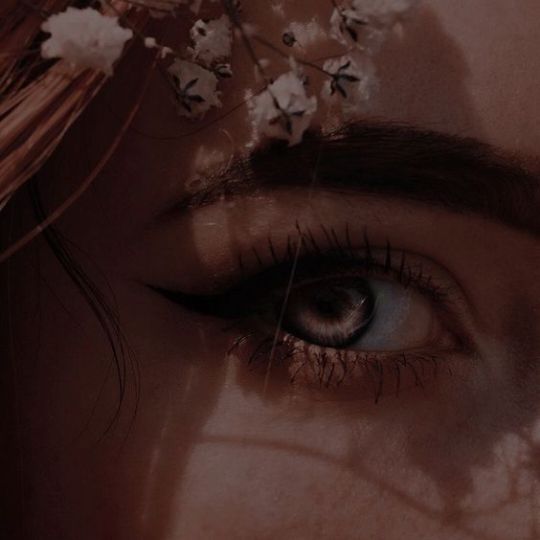

#writing advice#writingadvice#writingtips#writing tips#fictionwriting#writersociety#writing promps#writing tutorial#writing help#writing tricks#character tips#writers on tumblr#moon-delia#friendship
634 notes
·
View notes
Note
Do you still do writing tips?? Cause I need tips on writing a child (12/13) who’s been trained to be living weapon their whole life??
OH MY GOD YES. I LOVE YOU.
this is a massive post I’m sorry
Writing a Child Who was Raised to be a Weapon
tw just for abuse, eating disorders, and the like mentioned below
NOW. This is one of my favorite archetypes used in modern media, if you couldn’t tell by my batfamily oc insert (little mister was-only-kept-alive-to-destroy-bruce-wayne. hi there, bentley, love you!)
While this is a very compelling and interesting type of character to create and flesh out, it’s easy to brush over some of the inner dialogue and thought patterns these children would have, because most people irl don’t have them. (Unless you were raised as a super assassin, in which case, please don’t kill me, and I love you)
The bottom line is, the characters entire personality and dynamic with other people relies on what background you give them. And that’s where I come in! Hi, I’m maccreadysbaby, and I’m going to propose some of the routes you can take in writing these cute little (deadly) guys!
COMMUNICATION ↴
none of these children are going to communicate normally, because they aren’t normal. they weren’t raised with a family, or good support system. they might:
be terrified of others. slow to trust. especially if you’re writing a child who was abused when they failed. for example, my oc, bentley, was horrified to be in proximity with any of bruce wayne’s family because he was afraid they would hurt him like his father did. he was afraid to cry in front of them, afraid to admit he was tired or sick or scared, afraid to ask for help, afraid to speak first, because it was all things he’d gotten punished for before. they might also have a terrible relationship with failure, because failure brings pain, and could potentially crumble if they fail or think they’re going to fail whatever they’re doing. (a mission, an assassination, or simple things like a school test or a task someone asked them to complete.) maybe they’re really good at holding it together and pretending they aren’t scared, but after all, they’re just kids. the cracks in their mask are gonna show one way or another.
shut people out. this could be from fear, or from being taught relationships are bad and makes them weak and vulnerable. they might not communicate because they don’t want to have another potential weak spot. they might keep their distance, stay quiet, not come out often. they might come across as cold and heartless, but it’s really them just trying to protect themselves, be it from pain, from the idea of eventual heartbreak, etc. but there is a problem with shutting people out, and it’s that they’re also shutting themselves in, like a prison. kids who choose to shut people out and bottle up everything they feel are slightly more prone to emotional outbursts and breakdowns. especially if they’re fairly young.
learn different ways to communicate, such as sign language, their actions, body language, etc. they won’t do it like everybody else and that’s okay! you can take so many liberties with this. maybe they make origami swans and leave them on the nightstands of people they decide they like. maybe they highlight lines in books and leave them places to tell someone how they feel. maybe they’re an absolute little jerkhole that’s mean to everyone because they weren’t taught how to do it any differently. maybe they’re insanely submissive people-pleasers that do everything asked of them because they were created to take orders. the possibilities are endless. go on an adventure!
be overly trusting. you typically see this in characters on the younger end of the spectrum, but you can drag it up into teenagers, too. a child that’s been abused or suppressed in any way, physically, emotionally, or mentally might decide they wholeheartedly trust the first person who is nice to them, who doesn’t cause them pain. there might even be a little bit of lag time between the meeting and the kindness and the trusting, but when it comes, it comes full force to the face. they’d trust these people to protect their lives and might even cling to them, or run to them as an escape from whoever raised them. (assuming they are afraid of the people who raised them.) they might even allow themselves to open up and become more than just a human weapon in the presence of these lucky folks.
believe that they’re superior to everyone else. obviously they are a higher class, a finer type of person. they can kill in seconds, they’re a master at martial arts, they can have an adult wrapped around their finger within the first minute of meeting them, they can make a person cave with a single sentence, they’re just better. better than all these civilians who let their emotions get in the way, who let other people walk all over them and boss them around. they’re too good for that. this is also a great one to add in some angst. arrogance and pride are often founded on the feelings of uselessness, worthlessness, or that they can’t (or don’t deserve to) be loved. it’s like a defense mechanism. no one likes me — obviously it’s because of my blindingly obvious superiority. they’re so much better that they don’t need love, kindness, care. (but yes, they actually do. they’ll probably break down crying or throw someone across the room the moment it’s given because it opens their eyes to the fact that they’re literally freaking starving for it like they haven’t eaten in their entire lives. my GOD give these kids a hug.)
FOOD ↴
i know this seems random, but it’s something you need to know about your character because it heavily impacts their mental state, mannerisms, energy, and health. chances are being raised as a weapon, they won’t have a stable relationship with food or eating. here are some examples of how you could make them!
refusing to eat. if your child character has had bad experiences in the past regarding food, such as someone using food to manipulate them (if you don’t do this you don’t get food.), torture them (purposefully feeding them something that makes them sick or have an allergic reaction, even poisoned food.), or if there are bad memories tied to eating (always getting fed before terrible missions, or before days locked somewhere, torture sessions, punishments, etc.) your child may not want to eat at all. after all, these are still just kids and they’re going to try and avoid everything that can trigger negative feelings, memories, or circumstances. if food is one of them, your other characters are probably going to have to help reassure them that they can eat and need to (if they’re in the presence of nice characters.) if you’re wanting to go a more severe route, you can even write them getting diagnosed with anorexia (an eating disorder that heavily involves not eating at all.) but of course, you don’t have to. (i didn’t.) just remember, they are growing kids and are going to be hungry whether they like it or not. but they will try to hide it if hunger has been used against them, which is a good point for hurt/comfort writing, since hunger can cause anything as small and embarrassing as their stomach growling loudly in front of everybody to severe stomach cramps (like your organs being tied in a terribly tight knot), vomiting, and fainting. all things considered, you can take a more severe route, or just write about them working with the help of friends to get up to a better food intake level and higher weight.
struggling to eat. if your child has not been fed properly for most or all of their lives, and then are put into a homelife where they have food at their disposal, they still might struggle with it. (for example, my character, bentley, was severely starved by his father for the first ten years of his life and when he gets put into a new home, he struggles to eat much at all and sometimes feels sick when he eats ‘too much’, even though he should be eating more in general.) of course, this comes with a host of complications and all the symptoms that come with malnutrition, not to mention that they won’t even be close to the size they’re supposed to be. (bentley was the size of a 6-7 year old at the ages of 9&10.) this is similar to the last bullet point in the sense that you can go the more serious anorexia route, or the kind people helping them stay on track route
over-eating. this one is more common for youngsters who didn’t have access to food most of their lives, but it wasn’t used against them or withheld from them by another person. (a good example would be a child trained in an area where people routinely don’t have access to food.) this is highly derived from food insecurity, where they think they have to eat everything they’re given because they don’t know when they’ll eat next. (this can also be used for characters in the bullet point above.) this also can cause health issues and routine sickness. (for example, my character, asten (11yrs), who lived in a poverty stricken part of his city and barely ate outside of school, routinely eats himself sick when he has access to food because he’s been starving without it.) this food insecurity can also lead to extreme emetophobia (fear of vomiting) because they don’t want to lose what they do have in them, which can pose a massive problem when this child is either so empty or so full that they need to throw up. so, if they’re put into a household where they have access to food, it might be a constant stream of stomach aches and nights spent in the bathroom while the person helps reassure them that they will always have food and they don’t have to eat it all now. (sorry this is gross but it needs to be said.)
here is a drabble that i wrote recently involving a malnourished child due to poverty, with his internal dialogue and thought processes, if that will help any of you.
ANXIETY / PTSD ↴
oh boy. these kids will have it, given how they’ve been raised. the question is in how they treat it and deal with it.
hiding it. maybe they were trained to see fear and anxiousness as weakness. the flinch when someone moves too fast, the tightness in their chest at a certain noise, the inability to breathe if they see someone’s face, they’re going to hide it because their fine and they’re tough. no one has to know that they have nightmares every night and cry when they’re alone. you can even extend this into anxiety/asthma/panic attacks that they keep hidden. (typically by leaving social settings when they feel it coming on.) no one has to know that they’re so weak. they might lash out in anger or irritation if they’re routinely asked if they’re okay because they need these people to back off before they fall apart in front of them. they might have little mannerisms that other people might notice for calming or showing anxiety, like biting their nails, bouncing their leg, pinching themselves, quietly doing breathing exercises, etc. PTSD will come more like nightmares and anxiety attacks and flashbacks, and they can’t always hide those no matter how much they want to. the severity of anxiety and PTSD depends on how graphic you make their backstory. (for example, my character, bentley, has nightmares of being abused, which he breaks down crying after. in his instances, he’s never alone. similarly, he once started crying when he saw christmas decorations similar to those his abuser used to have, and he has his first anxiety attack when he sees his abuser in public) you can keep the character secretive about it or let them have a big old breakdown in front of someone else, your choice.
not hiding it at all. if they’re with someone they trust, they might just let loose. (that’s what happened to bentley once he learned his new family didn’t care if he looked weak and wanted to help him) they might tell someone when they’re feeling scared or anxious or bad in any way. they might just cry right in front of them when they have to and have attacks with someone close and all the things because they’re not alone anymore and these people want to help. it might take a while for them to get to this point, and no one blames them. (for example, bentley was really anxious for school so he went to his new guardians room in the middle of the night) and remember, any steps these kiddos take closer to asking for help is HUGE! make sure your other characters encourage them and let them know they’re proud for reaching out :)
keep in mind that if they’ve never been talked to about it, they might have no freaking clue what’s going on if they have an attack of some sort, and will probably need someone to explain to them what’s going on and that they aren't going to die.
Thanks for coming to my ted talk! If you have more specific questions send them in anon!
173 notes
·
View notes
Text
"Answer three questions for every character:
- Who is this character,
- What do they want,
- And How can I stop them from getting it."
-Someone once said something like this
#writing#creative writing#character tips#writing tips#beginner writer tips#writing community#writeblr#writers#writerscommunity#writers on tumblr#books & libraries#advice#good advice#fic writing#writersociety#female writers#writersofinstagram#writersofig#character template#character traits
230 notes
·
View notes
Text
Let's talk about Aspec characters and relationships!
I'm aroace. I write a lot of characters who are aspec in some way. I have a lot of aspec friends. And this is why your aspec character is driving me crazy. There's also sex talk in here so if you're not mature enough to handle it please scroll past.
Edit: Allos also should reblog this if you found it helpful.
First lets get some terms right:
Aromantic (aro) and Asexual (ace) are two distinct things. Aroace means you're both aromantic and asexual at the same time. It is generally referred to as 'aspec' (aro/ace spectrum) when you fall on one or both spectrums. If you are not aspec you are allosexual/alloromantic (allo). It just means someone who isn't ace or aro. You can also be aroallo or aceallo (aromantic allosexual, asexual alloromantic). All these terms are neutral and not used in derogatory ways similar to trans/cis. It's a descriptive word not a put down.
Now about those characters and their relationships. Because that is the most :))))) to me as an aroace is when people just don't know how to handle an aspec character. Usually because they're allo. But that's okay you probably don't know and we're all here to learn from each other. Here's some things to consider when you want to make or write an aspec person.
Ace's do sometimes have sex. They just aren't motivated by sex. That's it.
Along with sex your ace character may also masturbate and feel good being touched. They also might only like touching themselves and hate when other people do it. They usually also know when someone is hot/sexy and will comment on it. Finding someone sexy =/= we want to fuck them. Thinking someone is hot =/= we want to fuck them. We're still human. We know what a hot human looks like. Your ace character might be attracted to someone's appearance aesthetically but have no interest in their bits. Your ace character might fall in love with the most beautiful person in your story and never show any interest of wanting to bed them.
They can have boyfriends/girlfriends/romantic partners they do or don't have sex with. But they can be anywhere on the spectrum of sex repulsive, to sex positive, to absolute sex hound. Some of the horniest people you know are probably ace. Some of the horniest people I know are ace, and I have a lot of ace friends.
And we're not all virgins. Some ace's had sex and realized 'nah fam. Didn't do it for me' and never did it again. Others are virgins and have no intention ever of having sex. Others are virgins but don't care either way? It just hasn't happened. Others enjoy sex with their partners. Some are parents! You can be ace and had enough sex to procreate. Some also think sex is icky or it squicks them out. Some might be squicked out at the thought of sex with another person but they're fine looking at porn or doing it themselves. There is a wide range of what asexuals are into just like allos.
Aros also sometimes do the sex. They are not motivated by romance. That's it.
That being said your aro character can have a boyfriend/girlfriend/partner and it can be 'romantic'. It doesn't have to be a queer platonic relationship. Your aro character also might not want to be in a relationship at all. It is not weird for your aro character to call their partner their partner or bf/gf or if they're married their husband/wife.
Aro people do not get butterflies. They don't really get flustered around people they like. There's no spark. And they don't feel that romantic attraction allos do when they meet someone and fall in love with them. I've found that aro people are also terrible at flirting or picking up flirting cues. At least in my own personal experience when it took my aro ass 3 years to realize some girl was flirting with me and I just thought she was being nice to me. Take the 'useless lesbian' trope and take it to 11. We just don't know. Aro people also know when other people are hot. Just like aces just because we're aro doesn't mean we don't know a baddy when we see one. We just probably won't realize said baddy is flirting with us...
Aro character still love. They love their family, they love their friends, they love their partners. And it's all real love. The love is still there. Aro characters also probably know what they should do to mimic being in love. Even if we don't love someone more than platonically they may still do the things romantic partners do with their partner. Some don't! And that's fine too. Sometimes you're boyfriends and you share the same bed with him, and sometimes your girlfriend is just your roommate. Both are totally valid aro relationships. Maybe your character kisses their partner passionately and they like it, or they might only kiss during sex, or they might not kiss on the mouth. All valid and correct, still no romo. Kissing =/= romance for aros. Sex =/=romance for aros.
Aroace characters do all those things! At once! They can do the sex, and the boyfriend/girlfriend/partner and loving their friends. They just are not motivated by sex or romance. Kissing =/= sexual attraction. Sex =/= romantic love.
Being aspec is looking at the most beautiful and delicious cake in the world and going 'neat, cake' and walking away not even wondering what it tastes like, not even for a second considering having a bite. It's a cake. Neat. You are not motivated by cake. You don't even really care about cake. It's nice that other people fucking loooooooove cake but it's just not for you.
We also know what love is supposed to be like, what a 'healthy sexual' relationship should feel like. It's everywhere. All around us. Constantly. It's also sometimes fucking exhausting! It's why some aspec people can be a bit agro. We get it you're in love/got a new partner/are sleeping with someone/really sexually attracted to this person/keep spamming us with your celeb thirst pics/etc. It does get tiring sometimes. We don't care about the cake and sometimes listening to you talk about the cake drives us crazy. Consider that too when writing aspec characters. Sometimes their friends and their cakes are annoying no matter how much they love them platonically or romantically.
Anyway just some things to consider for your aspec OCs from an older aroace. Should be said aspec is a wide spectrum and I'm drawing on my own experience as an aroace with aspec friends, and my writing of those characters. If you have more questions about writing characters on this spectrum feel free to ask!
#writeblr#writblr#writing advice#character advice#asexual#aromantic#aroace#aspec character#writing tips#writing#character tips#writing help#character help#writers on tumblr
75 notes
·
View notes
Text
Making Characters That Make Sense
Walk-through character template & "how to" guide for writing complex, original protagonists.
If you google "character templates for writing", you'll get a lot of very basic examples that read like a grocery list: eye colour, hair colour, skin colour, positive traits, negative traits, etc.
And sure, filling out this kind of template isn't completely useless - but it's also not particularly useful, either. Choosing whether your protagonist has blue eyes or green eyes isn't going to determine whether readers connect with them or not.
Instead, I prefer to use the below template:
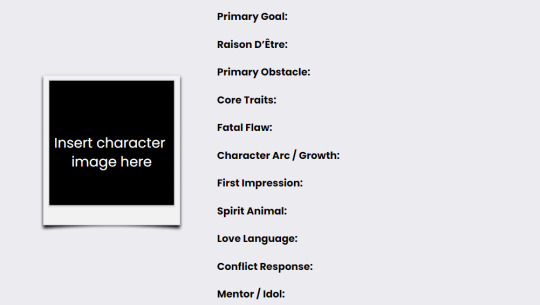
There's some fairly left-of-centre categories here, so in this blog post I'll be creating a character from scratch to demonstrate what each section means and how to use the template effectively.
Primary Goal & Raison D'Être
Fantasy Romance is having a bit of a tournament-to-the-death moment right now, with Hunger Games-inspired stories like Fourth Wing, Throne of Glass, The Savior's Champion, and The Serpent and the Wings of Night in high demand - so that's what we're going to work with in today's blog post.
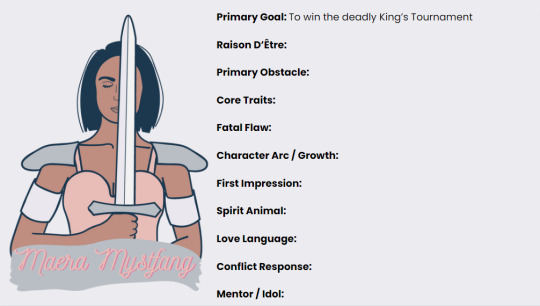
The story premise and primary goal of the protagonist are almost always interconnected. In this case, the story premise is a tournament to the death - and the character's main goal is to win that tournament, obviously.
But where there's room for some originality is in the raison d'être. This loosely translates to "reason for being" or "purpose". It's the why of it.
For example: what motivated this character to risk their life by entering such a tournament in the first place?
It is sometimes helpful to look at similar stories when thinking about this category. Not so you can copy their protagonist's motivations - but so you can do something different.
The whole selfless-self-sacrifice thing, for example - that's done. At least in relation to this particular sub-genre. We can do better for our hypothetical Maera Mystfang character.
Actually, let's really turn the trope on its head and make her raison d'être incredibly self-centred.

Already, this is character is shaping up to be something a little bit different within the niche of tournaments to the death. Which goes to show how putting a little bit of thought can go a long way, even with something as simple as identifying your character's initial purpose.
Primary Obstacle
Every protagonist needs a goal - and every goal needs an obstacle. This is what gives the story some tension and keeps readers turning the page.
An obvious choice of obstacle for this hypothetical character, since we're dealing with a fantasy romance, would be that Maera starts to develop feelings for one of her fellow competitors.
This concept has definitely been done, but that's okay. Not every section of this list has to break the mould. Tropes exist for a reason and it is totally okay to lean into them sometimes.
However, just for funsies, I'm going to try and put a slightly different spin on this one too.
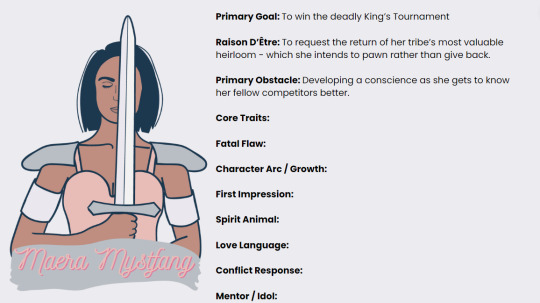
Instead of the obvious "I love one of the people I'm meant to kill", let's make Maera's (previously dormant) conscience be the problem. Her reasons for entering the tournament may have been self-motivated, but as she gets to know her fellow competitors - admires some of them, even - she starts to second guess those reasons.
Core Traits
A lot of character templates will divide personality traits into positives and negatives - but I don't think this is particularly helpful. It is far too one dimensional - not to mention unrealistic. The key components of someone's personality aren't usually so black and white.
In fact, most core traits are both good and bad at the same time - it just depends on the context.
Instead of being wholly positive or negative, try to think of three core character traits that can serve as two sides of the same coin, with both positive and negative implications to each.

For Maera, I've given her these core traits:
Self-reliant;
Rebellious; and
Good-humoured.
Her self-reliance means that she is incredibly capable - but it's also the cause of her selfishness. She's always had to look after herself, so she expects others to do the same.
Her rebellious attitude means she isn't willing to accept the status quo. But at times she is also a rebel without a cause, causing trouble just for the fun of it.
Her good sense of humour means she is fun to be around, but she also tends to not take things as seriously as she should.
Thinking of core traits in this multi-faceted way not only adds realistic complexity, but it also sets you up well for showcasing character development and growth throughout the story.
Fatal Flaw & Character Arc / Growth
You've probably read negative reviews that throw around terms like "Mary Sue" or "Gary Stu". People tend to be over-zealous with these terms, especially for Mary Sue, but the gist of it is that the character in question is "too perfect".
They're the chosen one, they're good at everything, all the boys like them, etc.
Some characters can get away with this just fine. Look at Aragorn. He's the ultimate Gary Stu but I still swoon every time he opens those damn doors. You know the scene I'm talking about.
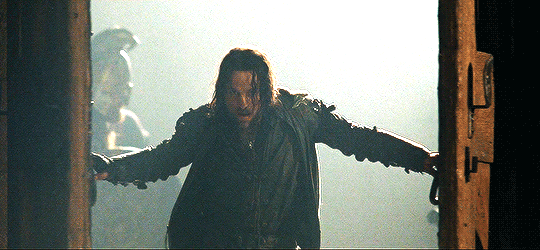
Ooft.
But for the most part, you want to incorporate a fatal flaw into your protagonists - because this is what gives them room to grow.
And, no. "I was born to be King but I don't wanna" does not count as a fatal flaw.
Instead, think bigger. Think worse. Think about where your character starts versus where you want them to end up. Think about how you want the events of the narrative to change their world view - or even their initial goal.
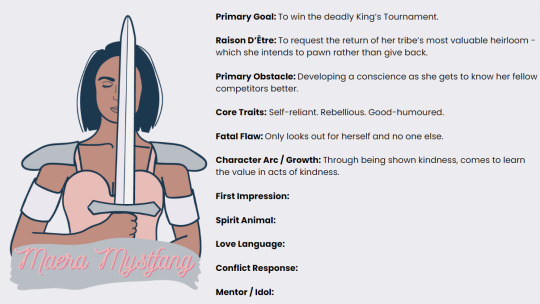
For Maera, her fatal flaw is pretty obvious, given her initial motivations for entering the tournament. Similarly, her growth/arc is linked to her primary obstacle, which is developing a conscious.
Her journey throughout this hypothetical story might be learning to appreciate how her past shaped her, while also acknowledging that there are things she can do to ensure others don't have to go through what she did. By being shown acts of kindness, she learns to appreciate their value.
First Impression
Now that we've covered all the "big picture" stuff, let's get into some of the smaller details that give your character some texture.
The first impression category is a hypothetical exercise where you image how your character might appear to a room full of strangers. In dual, multi, or omniscient POVs, you might even get the opportunity to include this impression somewhere in the story.
But even for first-person narratives, it is still worth thinking about, because it will help to inform how other characters interact and respond to your protagonist (at least at first).
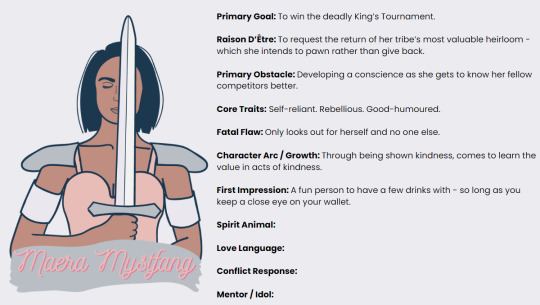
For Maera, I've written this first impression as: a fun person to have a few drinks with - so long as you keep a close eye on your wallet.
From this description, we can guess that Maera probably likes to have a good time, but also comes across as untrustworthy. Whether that impression is deserved or not is up to you, as the author, to decide.
There's also a lot of deeper directions you can take this first impression category, too. Like if most people react to Maera this way, but one particular character doesn't, then your readers are going to sit up and pay extra attention during that interaction. Especially when that person reacting atypically is the future love interest.
Spirit Animal
Ah, this one is a fun one!
I always encourage my authors to assign a "spirit animal" to their characters - especially when they're doing multi-POV.
There are two main reasons for this:
It will allow you to assign some very distinct adjectives and verbs with that particular character; and
It is an opportunity to flesh out some additional character traits beyond the core traits.
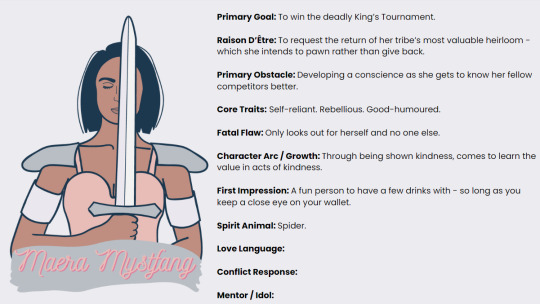
For Maera, I've chosen "spider" because she is solitary by nature, opportunistic, and patient.
But, more than that, I also like the idea of Maera being the kind of person who knows how to watch and wait. While her first impression might be "here for the good times", her joking façade is actually a mask she wears while carefully observing others.
For example:
Her words were laced with venom.
She crawled her way across the rooftop.
At some point, weaving lies had become more of a past time that a necessity.
Her thoughts were a tangled mess.
She didn't bother to conceal her predatory gaze.
Inch by cautious inch, she crept forward.
Her sanity was already hanging by a thread.
If there was one thing she knew how to do, it was spin a good story - truth be damned.
I've never outright compared Maera to a spider in these examples, nor have I made it blatantly obvious that that's what I'm doing. But by peppering these kinds or words throughout the story, I'll be able to subtly create a very distinct kind of impression for her character.
For comparison's sake, let's assign "cat" to the love interest. Examples of possible words to consider in this instance might be:
He clawed his way through the bushes.
"What are you doing?" he hissed.
The comment had some bite to it, that was for sure.
He slunk away into the darkness.
His still, unwavering focus was unnerving.
He prowled towards her.
In a few quick, agile steps, he'd made it across the parapet.
He yawned and stretched out beside her.
Of course, not every single word you use in association with a character needs to be related to their spirit animal. But keeping a certain type of animal in mind - and finding opportunities to throw in some subtle messaging through language choice - can be beneficial on so many levels.
It helps to distinguish your characters from one another through the kind of language you use to describe them - but it's also just really, really fun way to add some bonus texture to your characters. Giving your readers some little easter eggs like this is never a bad thing.
Love Language
If you're unfamiliar with the concept of the five basic love languages, then here's a quick visual overview:
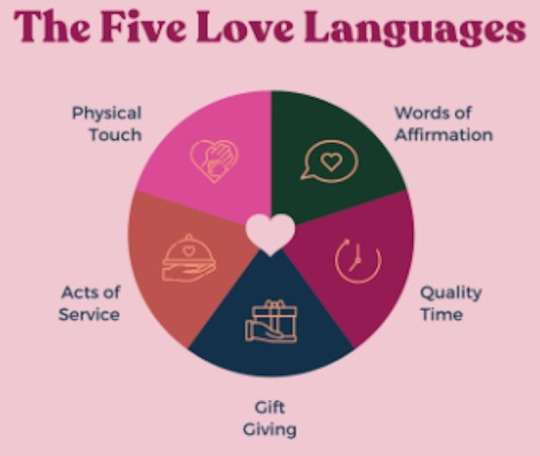
Love languages aren't a consideration that's specific to romance. They're important for friendships and familial relationships too.
Because thinking about what your protagonist values most in love is going to tell you a lot about who they are. Especially when you take the question deeper and think about why this is something they value.

For Maera, I've chosen "Acts of Service" because this ties in quite well to her character arc.
In terms of Maera's why, I could easily go with "because this was how she was shown love as a child" - and this is a good enough option most of the time. However, since her love language is very much tied into growing out of her fatal flaw, then I actually want to do the opposite.
Maera winds up valuing acts of service because this is something she craved - and wasn't given - as a child. She had to do things the hard way instead. Hence why she ends up appreciating the kindness of others so much. Such generosity is new to her - and precious.
Conflict Response
This is potentially one of the most overlooked character components. Conflict and tension is central to story telling, yet there is so little attention given to creating authentic, original responses to conflict.
The way I see it, there are three main considerations in regards to conflict response:
How your character reacts in the moment;
The unhealthy methods they use to deal with the aftermath; and
The healthy methods they use (or discover) to self-sooth.
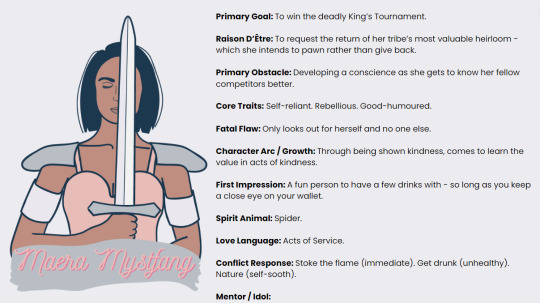
When faced with conflict, Maera's immediate reaction is to antagonise. She doesn't like to back down and enjoys creating trouble.
However, in the aftermath, the conflict affects her more than she lets on. She stews on it - and her solution to that is to get drunk until she can forget about it completely.
But even though she sometimes forgets it, Maera has a more healthy coping mechanism at her disposal. When she is surrounded by nature - in the forest, by the sea, whatever - it calms her.
In addition to identifying your protagonist's various responses to conflict, it is also helpful to think about why. Again, this is a great opportunity to insert something unique into their character backstory.
With Maera, for example, let's think about why she finds nature so soothing. Perhaps, amidst a very bleak childhood, one of her fondest memories is of picking grapes in a vineyard.
Perhaps the elderly woman who owned the vineyard was very rude and abrupt - but also quite kind to Maera in her own way. Maybe she would sometimes stitch up Maera's clothes or feed Maera a hearty, meaty dinner - even though she didn't have to.
If you're struggling to think of a real, tangible, unique memory such as this - then it's always helpful to go back to the old classic of write what you know. Think of a real life moment or memory - something that's stuck with you, no matter how simple - then adapt it to your character.
To create this vineyard example, I simply drew on my experience of picking strawberries with my Nonna after school.
Mentor / Idol
I could write an entire thesis on mentors. Or, more specifically, the "death of the mentor" trope - both in its literal and metaphorical interpretations.
But, for the sake of brevity, let's save that sh*t for another time and focus on what's important for a basic (yet complex) character template. And that is:
The Formative Mentor (past); and
Transformative Mentor (present).
The formative mentor (or idol) is someone who influenced your character prior to the events of the novel. Sometimes they're a character the reader will meet, or other times, they're long gone before the novel even begins.
The transformative mentor is a much looser term. It doesn't necessarily have to be a traditional mentor character, but rather it is a character who heavily influences or changes your protagonist throughout the events of the novel.

For Maera, I want her earliest idol to be a random female sell-sword who she crossed paths with. Prior to meeting this sell-sword, Maera was living without hope for a future, surviving on scraps and petty crime.
But after seeing an independent and moderately wealthy sell-sword in her local tavern, Maera got a glimpse into the kind of life that might be possible if she learned to fight. With the right kind of skills, she might be able to earn some decent money for a change - and travel the world.
This is an example of how "mentors" don't always have to be a wise wizard who oversees your protagonist's training and education. Young minds are impressionable - and even distant figures can have a lasting impact.
Just look at all the women who cite Legally Blonde as the reason why they were drawn to law. Elle Woods wasn't even real - but for plenty of young girls, she made an impact.
Similarly, your protagonist's "present" mentor or idol doesn't necessarily have to be a wise wizard either. It can simply be someone who motivates them to change their world view or strive to be better.
In romance, it is more than acceptable to have the present mentor coincide with the love interest - especially in standalone enemies-to-lovers. I know this seems counter-intuitive, since the word "mentor" implies a power imbalance, but it makes more sense if you readjust your definition of mentor to be "inspires change".
However, for Maera, I kind of like the idea of pairing her up with a love interest who shares some of her flaws. I vibe with the idea of making him a bit self-interested too, although for different reasons.
So in her example, I've listed the present mentor as a selfless secondary character. The way I would envision this going is Maera and the love interest team up early on - but somewhere along the way a secondary character saves them both. They're both heavily influenced by this character before this character sacrifices themselves. The aftermath of this incident rattles both Maera and her love interest, and serves as the spark for growth.
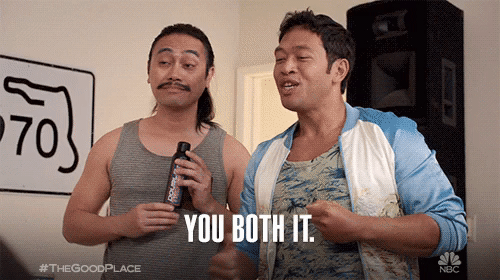
I hope you found this template - and very long explanation - useful!
#writing tips#character tips#book blog#writing#creative writing#character concept#originalcharacter#writeblr#writers on tumblr#writerscommunity#writer community#writer problems#writer things#original character#fantasy character#romance writing#writing advice#writer tips#writer tools#the smut analyst#raison d'etre#character traits#character tropes
164 notes
·
View notes
Text
y’all.
asexuality ≠ aromantic, and vice versa.
asexuals are perfectly capable of having and/or wanting romantic relationships.
aromantics are perfectly capable of having and/or wanting sexual expierences.
please stop assuming the two are interchangeable.
#Asexual#asexuality#asexual spectrum#asexual aromantic#aroace#aromantic#aspec stuff#aspec#aromantic stuff#character tips#writing tips#sexuality discourse#queer identity
310 notes
·
View notes
Text
Tips to Create a GOOD Relatable Character
Let's be real: we all love a good character that's unique and stands out from all the other boring ones because they're so different. They diverge from what we're used to. Thus, if the author pulls it off correctly, they become a fan favorite! Though they may be dissimilar from the other characters, they may be more alike to you than you initially assumed. Authors do this by keeping the character distinctive while throwing in some relatable qualities. Now, most people won't consciously notice these similarities, but they will be able to register them!
When creating a major character, relatability is one of the most important yet overlooked characteristics. It is able to fuel empathy within the reader, which keeps them interested in the story. And these are a few tips on how to create this effect!
There are several things you must remember when writing. Firstly, books and novels are shared with people. They are meant for others to read, but your purpose for writing shouldn't be for society. Write what you want to, what you believe in! Write for yourself! This allows you to express your ideas and emotions freely on paper. Secondly, you aren't alone. People have gone through what you have before, and while some experiences are unique to you only, there are definitely experiences we all share. The point is, someone will find parts of your character relatable and someone else won't. That's okay. Thirdly, you don't need to express yourself through only one character. Personally, I spread traits I have over many of my different characters as I see fit.
I think that those basics help you realize that your character's relatability should be built on what you believe, what you feel, and your experiences. Not anyone else's. And don't worry, many readers will still be able to connect with such traits! Now, onto the REAL thing! :D
You must understand yourself and your emotions on a deep level. Have you ever been betrayed by a friend? How did it feel? Did you break down? Did you not care? If something you've been through does happen in your writing and you find your answer similar to an answer your character might have, include it! Because then, you're writing from your heart, the event means more to you because you lived it! For the readers who haven't been in such a situation or reacted in an akin way, they will still notice the quality of writing and don't think that they won't empathize!
Your character does not need to consistently be relatable to the reader, it can be overwhelming and not to mention, a wide spread. In addition, the character will seem more basic. Sometimes, just a humane act from someone that isn't so benevolent will gain the audience's empathy, and that's really all you're trying to achieve. You want people to understand your characters. (This can also apply to the type of character I mentioned in the first paragraph). Perhaps you have a cold character with violent tendencies. A humane act for such a character may be saving or showing compassion for someone, but you have to consider their personality, it's most likely that they won't save a random stranger. Instead, it might be someone close to them. If you really want it to be surprising, then maybe they save an enemy! When the reader sees something like this happen, it will slightly alter how they view the character, and the moment will be more impactful because it's unexpected.
While in my opinion, the best way to create a relatable character is by channeling yourself into them, some people will disagree. In this case, you may want to focus more on feelings because more people will understand the emotions a character goes through better than their choices. However, this will work best on a more simplistic yet important character. One that isn't too complex, and will act like how most people would in their shoes. This could be the main character, even, as many authors try to make their lead relatable to the reader.
This is getting too long, (apologies) so in conclusion, you cannot make every character relatable, they all act and think differently. Reveal their qualities through small snippets at a time during appropriate moments! Different people will find different things relatable, anyway, so use your experiences as a guide! I hope that this will help!
Happy writing~
3hks :)
#writing#character tips#relatable characters#writeblr#writerscommunity#creative writing#writers on tumblr#writing tips#writer tips#writing advice
91 notes
·
View notes
Text
More Character Things
Decide their handwriting - Maybe write in their handwriting. Is it small and messy because they don't care? Do they write quickly because they're always in a hurry? Do they write neatly because they take pride in themselves? Handwriting can determine a lot.
Make them a playlist - Further adding onto this, their music taste can determine a lot. Maybe their music interest aren't the basic "because I like it, it's relatable, etc." Maybe someone used to play it in their car. Maybe their friend recommended the music. Maybe it's the music taste of someone close to them who passed.
Give them random quirks - Enough of those lengthy and excessive character sheets. Just make bullet points. Random little things about the character, some I have are things like "always has candy & soda" "anger issues tbh" "likes being out of the house". Nothing has to define a character, but it sure can help.
#writing#writing dialogue#writing ideas#writing inspiration#story#story ideas#prompts#dialogue#prompt#quote#character quirks#writing characters#character ideas#character traits#character tips#writeblr
56 notes
·
View notes
Text
Writing Problem: The Characters Are All Stereotypes
Problem: The Characters Are All Stereotypes
Solution: To be more than a collection of tropes, characters must be emotionally differentiated, possess myriad insecurities, battle visible and invisible vulnerabilities, willingly blur their own logic to achieve what they perceive as necessary, and debate their own flaws. Solid characters, well-rounded characters, and well-defined characters give readers a reason to stay engaged.
To craft these characters, authors should be conscientious of what internal rules the story's characters follow, what flaws these characters must overcome, and what trajectory each character arc takes in parallel to the overall narrative arc. Not every character needs to know who they are or how they want to influence the story to stick in readers' minds, but the author should have a good grasp how the character grows (or regresses) relative to how they engage the story's central conflict or theme.
Writing Resources:
10 Traits of a Strong Antagonist (Fiction University)
The No-Effort Character Sheet for Lazy Writers (justsomecynic; ahbwrites)
How to Write Deep P.O.V.: 8 Tips and Examples (Now Novel)
Character Flaws: Creating Lovable Imperfections (Now Novel)
How to Use Character Flaws to Enrich Your Writing (Perpetual Stories)
Character Flaws: When Is Too Far Too Far? (The Character Therapist)
20 Powerful Romance Tropes (and How to Make Them Original) (Jericho Writers)
Does Your Character Have a Secret? (Writers Helping Writers)
Creating Villain Motivations: Writing Real Adversaries (Now Novel)
Some Quick Character Tips (Coffee Bean Writing)
Dynamic vs. Round Characters: Who Needs a Character Arc? (The Novel Smithy)
❯ ❯ Adapted from the writing masterpost series: 19 Things That Are Wrong With Your Novel (and How to Fix Them)
#writeblr#writing tips#writing advice#writing problems#novel writing#fiction writing#character stereotypes#lovable imperfections#writeprob#character building#round characters#dynamic characters#character flaws#romance tropes#writing romance#character tips
52 notes
·
View notes
Text
𝙒𝙍𝙄𝙏𝙄𝙉𝙂: 𝙀𝙈𝙊𝙏𝙄𝙊𝙉𝘼𝙇 𝙎𝘾𝙀𝙉𝙀𝙎
𝒂 𝒔𝒄𝒆𝒏𝒆 𝒊𝒏 𝒘𝒉𝒊𝒄𝒉 𝒕𝒉𝒆𝒓𝒆 𝒊𝒔 𝒏𝒐𝒕𝒉𝒊𝒏𝒈 𝒔𝒆𝒓𝒊𝒐𝒖𝒔 𝒉𝒂𝒑𝒑𝒆𝒏𝒊𝒏𝒈. 𝒏𝒐 𝒐𝒏𝒆'𝒔 𝒍𝒊𝒇𝒆 𝒊𝒔 𝒂𝒕 𝒓𝒊𝒔𝒌. 𝒂𝒏𝒅 𝒚𝒆𝒕... 𝒕𝒉𝒆𝒓𝒆 𝒊𝒔 𝒂 𝒊𝒏𝒅𝒆𝒔𝒄𝒓𝒊𝒃𝒂𝒃𝒍𝒆 𝒂𝒄𝒉𝒆 𝒊𝒏 [𝒄𝒉𝒂𝒓𝒂𝒄𝒕𝒆𝒓]'𝒔 𝒉𝒆𝒂𝒓𝒕, 𝒅𝒆𝒔𝒑𝒊𝒕𝒆 𝒉𝒐𝒘 𝒄𝒂𝒍𝒎 𝒕𝒉𝒆𝒊𝒓 𝒔𝒖𝒓𝒓𝒐𝒖𝒏𝒅𝒊𝒏𝒈𝒔 𝒎𝒂𝒚 𝒃𝒆.
𝐎ne thing I notice new writers tend to think is that a emotional or important scene has to be dangerous. that there has to be risk. but that isn't true. in fact, the opposite can be! scenes where the surroundings don't reflect a character's emotions make them feel real; the rain won't conveniently come for you, so why should it for your character?
Scenes where a character isn't surrounded by pain, perhaps even surrounded by joy can make their misery all the more impactful. Describe the energetic, lovely, happy people around them. How their friends cheer and hold one another, play games and run amok. The bubbly, warmly colored room, the nostalgic and dazzling music. All while your character is breaking apart, their eyes glazed over like newly cut glass.
Using impactful words to show a character in pain makes the reader feel it, too. metaphors to describe their perspective, the hints that they aren't really okay, meshed with descriptive narratives depicting celebration causes such a contrast that it makes a heavy impact.
Of course, there are times where it's better to have the atmosphere match the emotions. this technique only works when used sparingly; having the same scenario, same metaphors makes your writing dull. if you feel like you're running out of writing methods, or that you're repeating your self, be it word choice or characterization or anything really, try writing one shots! think of a different approach to write each time for each one shot, so that you can explore what is best to write in what circumstance.
The world around your character is just as important as the character themself. Yes, it's important to have dimensional characters, and to build on their traits. But it doesn't matter if you're unable to convey it. One of the hardest things to do is to write an interesting story when a character and the world don't "match"; the character isn't motivated, doesn't care, doesn't... feel for their environment. Hence why so many authors and writers try to explain and show how important motivations and goals are for your characters, but then they don't explain it, don't tell you or show you why it is that they need a goal.
It's still possible; it's difficult but it is possible to write a story for a character without a motivation. It's just a very bad starting point for those who are new to writing, or haven't entirely figured their characters or writing style out yet. So don't take it as a "never", take it as " do this only if you really think you can work with it "
I'll make a separate post for a list of metaphors and descriptors I like to use, some are listed here above in the example (bolder) but there are lots more if you're at a loss!
5 notes
·
View notes
Text
I feel that when it comes to (non-apocalyptic) fantasy media, it’s easy for fans to ignore characters’ mental states and/or possible traumas when you’re focused on the world-building and lore, the external setting of it all. As in, when a character has some sort of mental struggle, it’s easy to theorize it was because of this magic system or that setting, instead of realizing that it might be a representation of real mental health issues and/or trauma.
#dusk rambles#fantasy#psychology#character analysis#character writing#mental health#fantasy writing#writers on tumblr#writing community#character tips
54 notes
·
View notes
Text
★ ៸៸៸ JEALOUSY ╱ post ❜ ✸ ៸ !?!
Along with many other emotions, jealousy is very complex emotion and requires you to break it down into tiny pieces in order for you to identify and write them.
It is very effective in writing as it helps a character realize what they really want and how badly they want it. It doesn't have to be central to the plot; it can be understated and supported by anger or fear.
It comes across in simple examples like a villain who is jealous of the hero, when two characters want one thing / have the same goal or when one character is more successful than the other.
★ ! THE TYPES ❪ 🎧 ❫ ៸ !?!
# ៸ sexual jealousy ― when a character's spouse or significant other displays or expresses sexual interest in someone else.
# ៸ romantic jealousy ― when your character fears the loss of a romantic partner or fears rejection from a potential or current romantic partner.
# ៸ possessive jealousy ― when he/she feels threatened by someone who could interrupt a friendship or relationship that they value.
# ៸ separation jealousy ― when your character has fear of separation or loss of a lover, partner, friend or parent due to their relationship with another person.
# ៸ work jealousy ― when your character feels cheated out of a promotion at work, or feels jealousy towards a specific person at work.
# ៸ friend / sibling jealousy ― When he/she feels inadequate when comparing themselves to their friends/family/siblings (they always try to one-up their friend/sibling).
# ៸ abnormal jealousy ― extreme psychological jealousy that results in or a combination of morbid, psychotic, psychological, delusional, anxious, controlling, immature and insecure behavior.
★ ! WHAT FUELS IT ❪ 🎧 ❫ ៸ !?!
There are many reason for someone to be jealous of another person. It could be rejection, confusion, frustration, powerlessness, insecurity, suspicion, loneliness or distrust. Choose the reason that fits the type of jealousy.
★ ! HOW IT EFFECTS ❪ 🎧 ❫ ៸ !?!
Do they have an increased heart rate or body temperature? Do they become angry and clench their fist, have verbal outbursts, stare downs and tensed muscles? Do they become quiet and have a dry mouth?
★ ! THEIR REACTION ❪ 🎧 ❫ ៸ !?!
★ make up stories/gossip about that person so that others will have negative feelings towards the same person.
★ feel overwhelmed and underachieve in every sphere of their life.
★ avoid the person all together.
★ take up a bad habit or addiction in an attempt to deal with their feelings.
★ become obsessed about something (like over exercising and dieting to beat their rival in a tournament or something more sinister like plotting another character’s demise).
★ manipulate others into feeling sorry for them.
★ over criticize themselves and everything they do.
★ harm themselves, their environment or others.
★ show a blatant disregard for the needs and desires of others to fulfill their own.
★ bully or intimidate the people around them to gain a false sense of power.
★ abuse others physically or psychologically.
★ flaunt their wealth (or fame, intelligence, status, beauty, etc.) to mask their own insecurities.

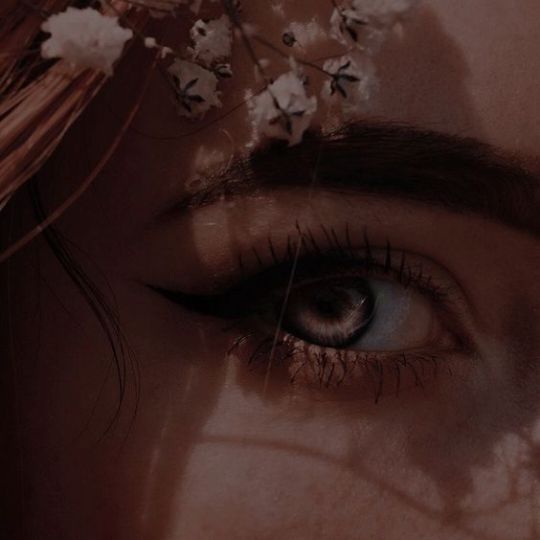
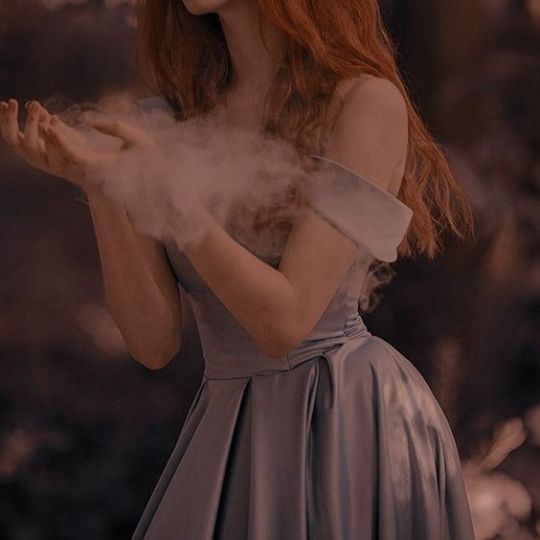
#writing advice#writingadvice#writingtips#writing tips#fictionwriting#writersociety#writing promps#writing tutorial#writing help#writing tricks#character tips#writers on tumblr#moon-delia#quirks#character quirks
543 notes
·
View notes
Text
genuinely sorry for the lack of art posting ^^” drawings have beentaking slower due to uhhhh :D maybe my lazieness -w- and plus- ANATOMY is hard you know???? I AM VERY VERY VERY picky of the pose i am choosing for my two clowns and struggling with the MOST important thing of them! their heights/j
BUT
LIKE genuinely i can’t figure out who should be the taller cause i think it looks cooler but i like them both tall but it loooks uh a bit funny but idk idk :P cause i don’t actually have their personalities set in stone, sometimes walley is more like elegant and polite then i imagine him to be more serious and grumpy, THEN i think he’s scary and a playful :P
and thats the same kinda with Ronn, Sometimes i imagine him to be a total airhead then he is more deadpan then theres him scary and another idea pf him being twofaced- TOO MANY PERSONALITIES I IMAGE THESE TWO TO HAVE TWT
pls any advice
so yeah having struggles with their designs bc of that, STRUGGLING WITH THEIR HEIGHT- LIKE WHY THIS OF ALL THINGS TWT it should b easy but when it comes to me i overthink it and then i feel burnout kicking in
#artist#art tips#art help#drawing help#clown character#character design#character tips#artists on tumblr#small artist#oc artist#oc help#character help#art critique#art update#artist struggles#artist stuff#art stuff#oc stuff#character stuff#my art stuff#oc#my clown ocs#mr walley#walley and ronn
3 notes
·
View notes
Text
one thing i see pretty frequently when people write stories about a character who is Going Through It is that people often... dont use anger. And I understand that, because you dont want to write an angry character; you want to write a sad/anxious/generally miserable character. And I think a lot of people are writing from their own experiences with depression or anxiety and might not view anger as their most prominent emotions.
But anger is such a crucial part of being generally miserable, and I wish people incorporated it more.
Here's the thing: people feel angry instead of something else. Betrayal, shame, vulnerability, embarrassment, whatever. It's a secondary emotion. When you're anxious, depressed, scared, stressed, it's uncomfortable. You're more likely to snap at someone who doesnt deserve it.
Anyways, this is all a really roundabout way to say: if your character is going through it and repressing their emotions and then suddenly they hit their breaking point and everyone finds out how much they've been struggling? That breaking point should be anger. It's so much less likely to be breaking down in tears (although there might be tears) than to be making a bitchy comment and then losing it when people call them out. People shut down. They get passive aggressive. They get Actively aggressive. They shut people out or they get confrontational. If you incorporate this into your stories it'll make your characters feel so much more complex and real.
#there are of course exceptions to this#there are people who struggle to express anger#and this causes problems too and can still be done really well!#but it's so so good to show the issues the character has as actual ISSUES#writing tips#writing advice#writing#character tips#character advice
5 notes
·
View notes